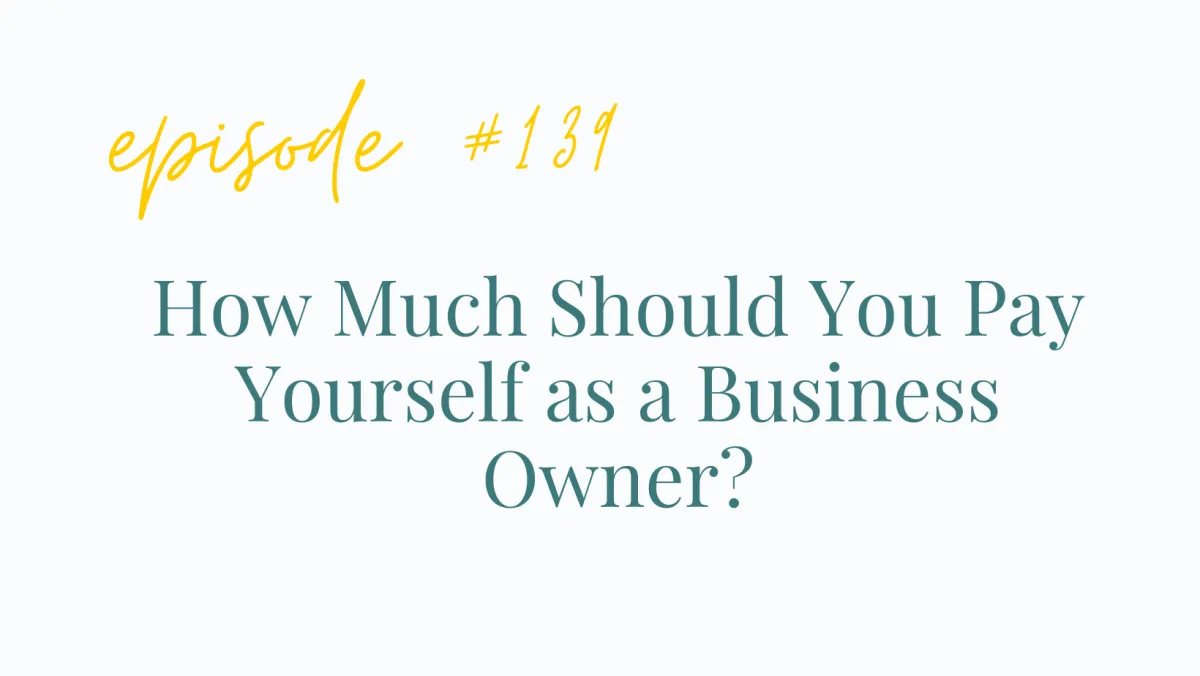
The EffortLESS CEO Podcast
Your weekly dose of actionable strategies for working less and living more.
The EffortLESS CEO Podcast
Your weekly dose of actionable strategies for working less and living more.

Grab your earphones and join me in conversation...

EP# 139 How Much Should You Pay Yourself as a Business Owner
👇LISTEN HERE NOW👇
How much should you pay yourself as a business owner in South Africa? Do you know?
You might think, "However much I want, I’m the boss." And while you do get to decide, there are a few things you may want to consider to ensure you take care of both your financial needs and your business.
Here’s what we’ll cover today:
1. The three most common mistakes business owners make when it comes to paying themselves.
2. I will share a simple method to calculate how much to pay yourself so that both your financial needs and your business's needs are met.
3. You’ll get my owner’s calculator to work out exactly how much you should pay yourself, save for taxes, and for a rainy day, so you can manage your business money more confidently.
Before we dig in. I work with service-based businesses. The majority of business owners who come to me for help have either private companies, in other words their business is registered as a pty ltd. Or they run their business as a sole proprietor. We are not going to go into detail on the difference or the advantages or disadvantages of each but. It’s important to note that if your business is a private company or pty ltd, you actually have an opportunity to pay yourself twice. Once as an employee and also through dividends. Which is basically a share of the profits. I have centred this episode around these two types of businesses. That being said…it will be helpful for you regardless of the type of business you’re in.
Please note that this is not meant to replace financial advice. I am not a financial advisor. I am also not an accountant. If you’re unsure what type of business structure is right for you, it’s a great idea to speak to an accountant and do your own due diligence.
Here’s why this episode is going to be super helpful for you today:
It is going to help you take control of your business finances and help you to:
Pay yourself a consistent monthly salary out of your business
Help you to never run out of cash…because we know…cash is queen right?
Help you create a reserve of funds so that you are saving for the future of your business which means you can fund your business’ growth and expansion or just have a nice cash cushion that will help you for those “life happens” moments.
We’re going to start with the most common mistakes or pitfalls business owners face when it comes to compensating themselves for the work they do in their business:
1. Not paying yourself consistently:
There are a few reasons why you might not be paying yourself consistently from your business right now but the biggest culprit I see with my clients is that they pay themselves last. They pay themselves whatever is left after they’ve paid everything and everyone else.
You have to shift this mindset and pay yourself FIRST.
You aa the business owner are taking a ton of risk and it's important to take care of your personal financial needs. If you don’t pay yourself consistently, you should ask yourself why. If you have a team member that worked hard and supported your business growth, would you be okay with not paying them consistently? Why would you do that to yourself?
A book that really helped me understand the importance of paying myself first is Profit First by Mike Michalowicz.. if you’re a business owner…get this book. It will change the way you think about and manage money inside your business.
I teach this concept to all my clients and I use it in every business I own.
Once a week, I have a Money Date with my business and I distribute all the income that came in that week into four different accounts that are set up within my main business account at FNB.
Here’s how I distribute my revenue inside mg coaching business:
10% goes to my profit/cash reserves account, which is a high yield savings account.
25% goes into my owners compensation account. This is from where I will pay my salary at the end of the month.
30% goes into another high yield savings account for taxes.
And the remaining 35% goes towards my operating expenses.
The profit account is reviewed once a quarter and a portion of it is distributed as dividends and the rest is retained for cash reserves so that there is always a cash cushion inside the business.
When it comes to taxes, I like having more saved for taxes than I might need. Rather than not having enough comes tax season.
I am going to share how to calculate how much you should pay yourself in a minute but the important thing here is to commit to paying yourself a consistent amount every month. Even when the business’ revenue fluctuates. And this is what makes the different accounts so valuable because in the months that my business brings in more revenue, I am also putting more aside, which means I have money saved up for those months where revenue might be down a bit…so I can still pay myself a consistent number.
2. Not paying yourself enough:
What is enough is obviously not going to be the same for everyone. The type of business, your business model, whether you have employees…these things will all factor into how much you should pay yourself. What I typically see is that business owners don’t pay themselves enough because they don’t have a grip on their expenses. They often don’t realise how much they are really spending. They aren’t tracking or measuring their numbers and as a result their expenses are way higher than they should be. If your expenses are too high, there won’t be enough to actually pay yourself. We want to keep our business expenses as low as possible. Check in on your expenses regularly. I go through my expenses every quarter…line by line to make sure that the software and subscriptions and everything else that is flowing out of my business is still in line with my goals.
It’s important to have a budget for your business and to look at your actual income and expenses as well. Everytime I sit down to crunch some numbers with my clients, we almost ALWAYS find money inside the business that they can allocate towards compensation for themselves on a consistent basis. The key here is…don’t trust your gut when it comes to the numbers. Measure and track them.
Something else to consider as you decide what to pay yourself is to look at what it would cost to replace your skill set within the business. Ideally, you want to pay yourself at least as much as it would cost you to hire someone to do what you do in your business. Even if you aren’t planning on replacing yourself any time soon.
3. Paying yourself too much:
When are you paying yourself too much? Well, before we can answer that question we need to look at how much you should be paying yourself from your business.
So here’s the formula:
You want to pay yourself 25-30% of your real revenue. That means your top line revenue minus any direct costs…of cost of goods sold as we call it on the Profit and Loss statement. If there aren’t any expenses as a result of the services delivered then you would use your top line revenue number.
You also want to put a portion of your real revenue aside for taxes and as cash reserves inside the business.
The ideal split might look different for your business, and I suggest you sit down with your accountant to determine what will be best for you specifically but here’s what I typically recommend for my clients who own service-based businesses:
5-10% goes into the profit/cash reserves account
25-30% goes into the owner’s compensation account
30% goes into that tax account
30-40% goes towards expenses
Paying yourself too much means you’re taking out more than the recommended 30% and you have no savings for taxes and no savings for a rainy day, or no money in cash reserves.
I suggest having two high yield savings accounts inside your business account…I bank with FNB and use their 48hr notice account. So the 30% of revenue I put aside for taxes and the 10% that I save as profit/cash reserves goes into those high yield savings accounts which gives me a higher return on my funds than I would receive in a normal savings account and it is also easy and quick to access when I do need it, but it is not as easy as just transferring funds immediately from one account to the next…that 48 hr time delay is there and helps me to not make impulsive decisions.
The bottom line is, if you are taking everything out of the business and there are no extra funds for the winter months or unexpected expenses or taxes when they are due, it will put you in a difficult financial position. And you will need to borrow money or dif into cash flow to get out of the situation. Which can cause a lot of unnecessary stress and anxiety.
Here are a few extra tips to help you manage your business finances better:
Treat your business as a separate entity. You are not your business. Your business money isn’t your money…even if you’re running your business as a sole proprietor and SARS sees hour revenue as your personal income. You need to still keep your business money separate from your personal money. When you don’t view your business’ money as YOUR money but rather see yourself as the custodian of that money then you will treat it differently. You have a responsibility to take care of it and do it well.
Reduce expenses and get your compensation number in that 25-30% range. This might mean that you need to increase how much you’re paying yourself. It might mean you need to reduce how much you’re paying yourself. Remember, you don’t want to take out all the money that is left in your business. We need to build nice cash cushions inside the business so that we have a buffer for those unexpected moments. It’s always a savvy move to keep your expenses as low as possible. So, go through them line by line and cut anything that isn’t absolutely necessary.
Increase your revenue without increasing your income. If you’re paying yourself too much and you can’t pay yourself less because maybe you have personal debt or just can’t live on less than you need to increase your revenue. And then as you increase revenue…don’t pay yourself more. Just because the business is making more…does not always mean that you should get paid more.
Start putting funds away for taxes and savings. If you don’t have any money saved for cash reserves or taxes, start by putting 1% of your real revenue into two high yield savings accounts every month and don’t touch it. Track hour numbers. And increase that 1% every quarter until you’re in line with your own ideal split.
A small shift in the right direction is all you need to get started on a more secure financial future for yourself and your business.
I have created a simple calculator that you can use to determine exactly how much you need to save for taxes, cash reserves, and pay yourself. It will also show you where you fall within the guided percentages that I discussed above. You can grab the calculator at ilonkaras.com/salarycalculator
You can watch this weeks podcast video HERE
LOVE THE WILDLY ALIGNED PODCAST?
Okay, friend! I'm gonna give it to you straight, 'cause you know that's what I'm all about. Podcast reviews are super important to Apple Podcasts and the more reviews the show receives the more likely it is that we'll be rewarded with better reach. We want to reach more fierce female entrepreneurs who can add extreme value to our amazing tribe. Help a sister, out?
We already love you, for real, but we’d be extremely grateful if you would review on iTunes! If you've loved this podcast, never miss another one! All you have to do is SUBSCRIBE to the Wildly Aligned Podcast on iTunes/Apple Podcasts.
ilonkaras.com | Ilonka Ras Coaching Pty Ltd
All Rights Reserved

